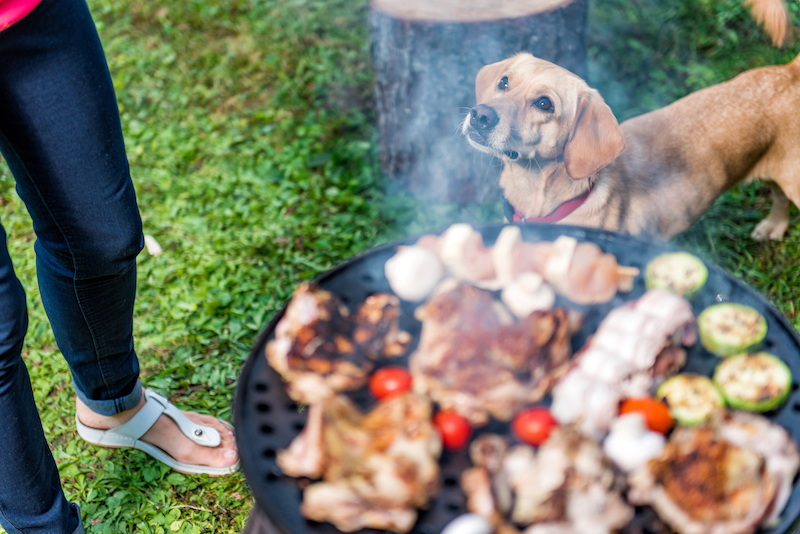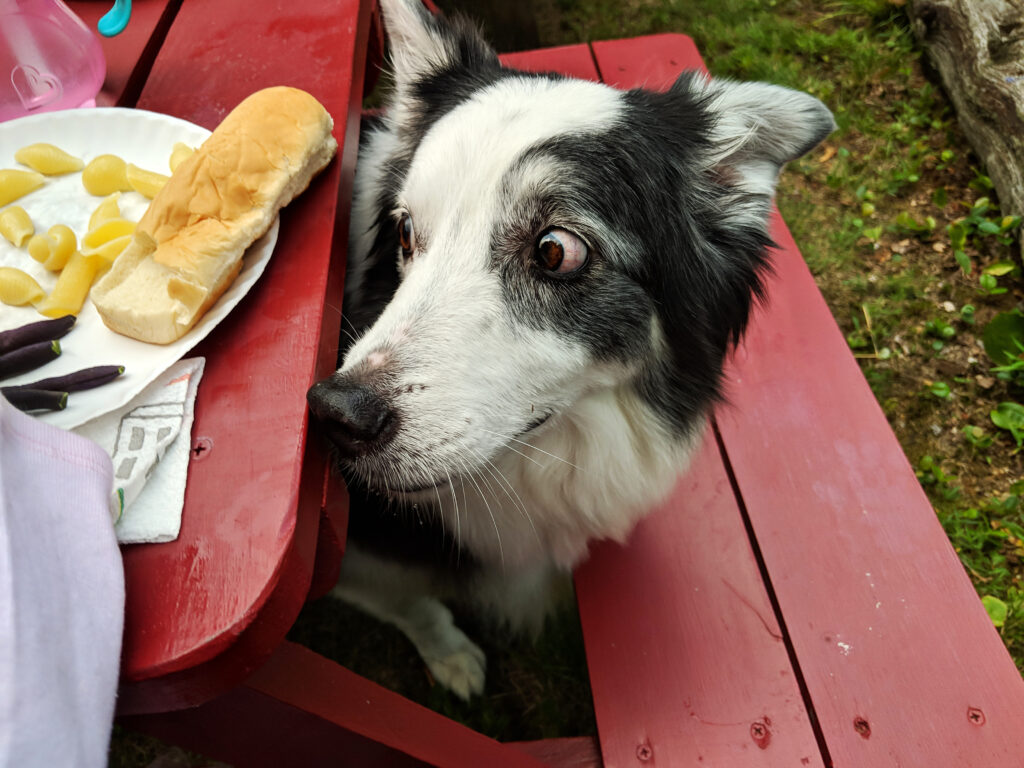BBQ season is upon us. That means your four-legged friend will soon be hanging around the grill, begging for a bite.
You might be wondering things like—what BBQ foods are safe for my dog to eat? What foods should I keep out of reach? Can I spice up my pooch’s regular dog food with a dash of barbecue sauce?
Read on to learn more about how to keep your dog safe at a BBQ.
What’s safe for my dog to eat at a BBQ?
A rule of thumb is to stick to plain, unseasoned, well-cooked meat in small portions, including:
- Plain, boneless, skinless chicken and turkey
- Lean beef—like a burger patty, or certain kinds of steak, such as sirloin tips, or top round steak (no T-bones)
- Lean pork cuts—like a tenderloin
- Hot dogs—in moderation, without any seasonings or condiments (But they aren’t the healthiest choice for your pooch, so avoid large amounts.)
- Fish—like salmon or cod, but make sure they’re de-boned. Avoid types of fish that are high in mercury, such as tuna.
For the veggies lovers, sweet potatoes are a nutritious, dog-safe option. Just make sure they are plain and well-cooked before letting your pooch dig in.
On the hunt for a cool, refreshing snack that doesn’t need the grill?
Let your pooch embrace their watermelon sugar high—without the seeds or rind. Also, blueberries are vet and dog-approved, and can be a sweet relief in the dog days of summer.
What foods can be dangerous for my dog to eat at a BBQ?

Dogs are our best friends, and we want to share everything with them. But that doesn’t necessarily mean you should share what’s on your plate. Many human foods can pose serious risks to dog health.
Some types of meat and bones
Dogs can safely enjoy many types of plain, cooked meats, but there are some things that should be off-limits to your canine friends, including:
- Fatty meat. Meat with a high-fat content—like ribs or certain cuts of steak and pork—can lead to pancreatitis in dogs, a serious and potentially life threatening condition.
- Cooked bones. When bones are cooked, they can become brittle and more easily splinter when chewed, which can cause blockages or injuries in your dog’s mouth, throat, or digestive tract.
- Small bones. Bones that can easily be broken down into smaller pieces—like poultry bones and fish bones—are a choking hazard.
- Large and dense bones. These can be too hard for your dog to chew on, which can lead to dental damage, like cracked teeth.
- Raw or undercooked meat. If you don’t fully cook meat, it might not kill bacteria like Salmonella or E. Coli, which can lead to foodborne illnesses. Dogs can usually handle a bit more bacteria than humans can, but they are not immune to these risks.
Bones in general—even ones from the pet store—aren’t recommended, as they can pose significant risks to your dog’s health and safety. They can splinter or break into sharp pieces when chewed, potentially leading to choking, dental damage, or injuries to the mouth and digestive tract. Consuming bones could also result in serious digestive issues, including blockages and perforations, which can require emergency veterinary treatment.
Kebabs
Dogs likely don’t understand the concept of a skewer and might try to eat the entire kebab, skewer and all. These pokey skewers can cause serious injury to your dog’s mouth and digestive system.
If your furry friend swallows a skewer, it could potentially puncture their stomach, and even enter their heart, which could be fatal. It could also cause intestinal blockage—a life threatening emergency that may require surgery, costing roughly $2,000 to $10,000.
Corn on the cob
We can’t imagine a more beautiful thing than corn (it has the juice). Corn itself isn’t toxic for dogs—it’s actually a great source of carbohydrates, fiber, antioxidants, and vitamins. But corn on the cob is a serious choking hazard, and if swallowed could cause life threatening intestinal blockage.
So if your furry friend’s giving you puppy eyes for some corn, make sure to scrape it off the cob first. And don’t let them chew on the leftover cob like a toy.
Allium vegetables
Onions, garlic, and their relatives contain compounds that can damage a dog’s red blood cells, leading to kidney failure. If your dog eats them, symptoms may include an upset stomach and excessive urination.
And in general, don’t let your dog eat these toxic foods—like chocolate, pitted fruit, or avocado. (Sorry Rover, no guac for you.)
I put BBQ sauce on everything, can my dog have it too?
The short answer is no. BBQ sauce and ketchup, whether homemade or store-bought, are not dog safe. If you let your pooch indulge at a BBQ, make sure they don’t eat anything that’s seasoned or marinated in sauce.
BBQ sauce and seasonings are high in sugar, salt, and fat, which can lead to dehydration, high blood pressure, and pancreatitis in dogs. These sauces often also contain onion and garlic, which we mentioned earlier, are dangerous for dog consumption (even onion powder and garlic powder is a no-no).
Plus, if the sauce contains artificial sweeteners—like xylitol—it can cause toxicity and even be fatal.
Symptoms of xylitol toxicity can appear in as little as 30 minutes and include vomiting, weakness, stumbling, and seizures. If your dog eats BBQ sauce and starts showing signs of xylitol toxicity, contact your vet, an emergency veterinary hospital, or an animal poison control center right away.
But if you really want your pooch to enjoy some paw-licking good barbecue sauce at your next cookout, check out these pet-friendly recipes.
Grill safety tips for pets

Keeping your pooch safe during BBQ season goes beyond just monitoring what they eat. Take some extra precautions to create a dog-friendly environment.
Keep the grilling area off limits
To your dog, a grill might just look like a personal buffet packed with tempting treats. But they likely won’t notice the extremely high temperatures and fire hazard.
Make a clear boundary around the grill that your dog isn’t allowed to cross, and keep an eye on them to prevent any burns, accidents, or unapproved snacks.
Watch out for food hazards
Grilled foods, sides, sauces, and dips often contain ingredients that can be harmful or even fatal to dogs. Make sure all food items are kept out of your dog’s reach, but especially the hazardous ones.
If your dog can easily reach over a table, and is getting allured by the smells, consider putting them inside, on a leash, or in a crate while there’s food out.
Keep trash covered
Dogs are notorious scavengers. Ensure all trash bins and food waste, including cobs, skewers, and any food with seasonings, are secured.
Too Much of a good thing
Even foods that are typically safe for pets can still cause mild digestive issues. When you introduce a new food to your pup, or give them food that they don’t eat often, it may upset their tummy, or even cause things like diarrhea. Feed these novelty foods in moderation, like a snack, and monitor how their tummy reacts.
Protect your pooch from the dog days of summer
You do so much to keep your dog safe, but accidents can happen. We all know how quickly dogs can sneak a forbidden snack when our backs are turned, which can turn out to be toxic or a choking hazard.
Pet insurance can give you peace of mind that you can get your pooch the medical care they need, without stressing about the financial burden.
For example, a base Lemonade Pet policy helps take a bite out of vet bills for diagnostics and treatments related to accidents and illnesses (provided those occur after your policy’s waiting period has ended). And you can easily customize your pup’s policy with our preventative care packages and optional add-ons to meet the unique needs of your pup, all with your budget in mind.
Click below to get your quote started.
A few quick words, because we <3 our lawyers: This post is general in nature, and any statement in it doesn’t alter the terms, conditions, exclusions, or limitations of policies issued by Lemonade, which differ according to your state of residence. You’re encouraged to discuss your specific circumstances with your own professional advisors. The purpose of this post is merely to provide you with info and insights you can use to make such discussions more productive! Naturally, all comments by, or references to, third parties represent their own views, and Lemonade assumes no responsibility for them. Coverage may not be available in all states.




